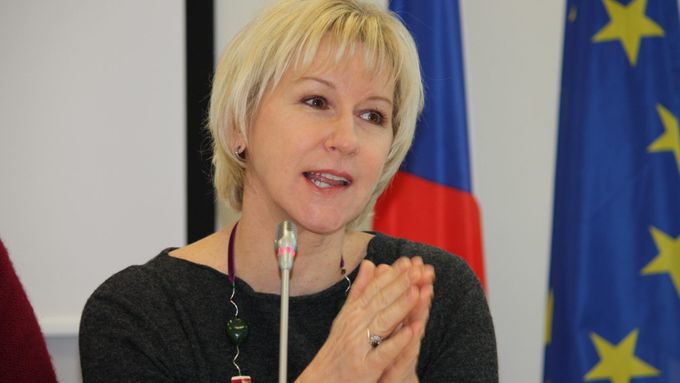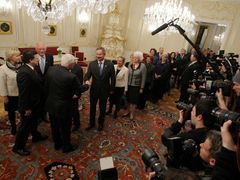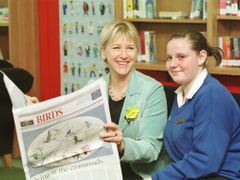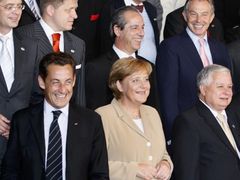Prague - Vice-president of the European Commission Margot Wallström holds an uneasy task, indeed. Her job is to communicate the EU affairs to the public as well as the Euro-commissioners themselves. To do so at a time when Europeans seem to be losing faith in the common European project looks like a "mission impossible".
"My position is often called "mission impossible", but I say it is a mission irresistible," says the Euro-commissioner who as the first member of the commission started her own blog a year ago.
In an interview with Aktuálně.cz Margot Wallström discusses why it is so hard to love the EU, gives her view on the Czech EU presidency slogan, upcoming Swedish EU presidency and much more.
The second part of the interview about her view of the position of women in the Czech society and politics will follow tomorrow.
As a communication expert, what is your impression of the Czech EU Presidency's slogan "We will make it sweet for Europe"?
I think we understood that this can be a little bit ambiguous and has connotations that we [euro-commissioners] do not fully understand but there is a sense of humor behind, don't ask us to explain it because it is a bit internal, well, maybe a bit national but I think it is cute.
This is also part of the beauty of this diverse Europe. That the member states can actually play on that. It is their right and I don't find it problematic either.
In the National Theatre [during the opening of the Czech EU presidency] where Topolánek gave a very good speech by the way, some people may have missed playing the Czech anthem but I told them it might be missing in the Swedish presidency as well because we don't put the same weight to symbols, it is not as important to us. We never liked too much use of flags and anthems and all of that.
Sweden is the next country that will take the EU Presidency over after the Czechs. What is the mood in Sweden towards the EU?
It is very very pragmatic. Some would say it is even a bit about money - what can we get out of it? On one hand, we feel that we can stand on our own feet but at the same time we also see there is a need to tackle most of the political issues in cooperation with western Europe. A small export dependent economy like that of Sweden would be nowhere without access to all the European and global markets. Scandals in Sweden are about money, sex is not interesting, money creates problems (laughing).
You wrote a book Why is it so hard to love the European Union. Why is it so hard then?
Because the EU is depicted in its extremes. Either it is very consistent and powerful and than it is threatening or it is depicted as dealing with curbed cucumbers, the size of strawberries or how many wolves should be shot this year and then it is ridiculous. But it is very difficult to describe the whole range of the activities that the EU deals with, from trying to solve the problem in the Middle East to count codfish in the Baltic Sea to make sure we don't overfish and everything in between. How do you describe that to ordinary people and how do they find themselves in that? How can they influence the EU? It is so pragmatic that sometimes people feel it is not easy to relate and feel alienated from it.
Your second mandate is drawing to an end. Could you summarize your mandate?
My position is often called "mission impossible", but I say it is a mission irresistible. My mission is to change people' s mind about the EU but this is about the long term changes. It is not easy to measure success in my position because how do you measure successful communication.
I have interpreted my job as strengthening democracy, the fundaments of the EU and make people listen more. But sometimes it is extremely frustrating because it is easy to say but they do not always live up to the goal of communicating better. I think today people in the commission know that the motto is listen better, explain better, and go local. For the first time we have an agreement between the three EU institutions that all of us will work on communication priorities.
And what means do you use to enhance the communication?
We have put much more emphasis on the use of internet. We have a youtube channel. I was the first to start blogging. We are starting to use both internet and the audio visual much more. Webcasting, podcasting etc and that is the only way to engage people in debates and to get more information out.
Do you feel more as a Swedish or European?
Both. I feel very Swedish and I will always defend the region where I come from. That's where my roots are, that's where my cultural cradle is and that has shaped me very much. But I see no contradiction also feeling very European. That's why I feel at home, here in Prague. This is what the EU is about - you can go to France and you feel like home there. Because we are this bigger family, we share so much and yet are so different and we can tackle problems together.
And you see this also in the EU - all the ministers from 27 so different countries, sitting around the same table, identifying problems and being able to agree on legislation how to tackle it, it is amazing. Countries that used to fight each other are sitting by one table.
My dream is that every young person could spend a week or two in another member state in the future - to study or work, to do a voluntary work maybe, or a scholarship whatever. This would really build his or her sense of identity or belonging to Europe.



